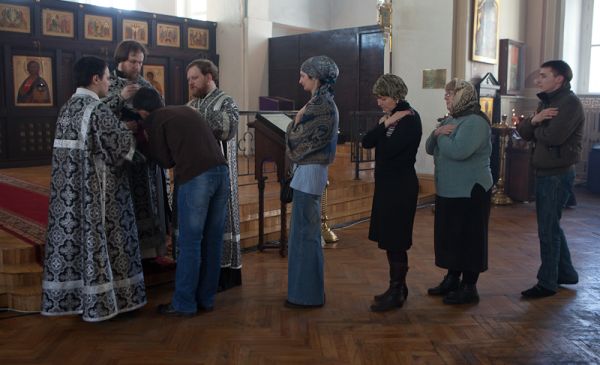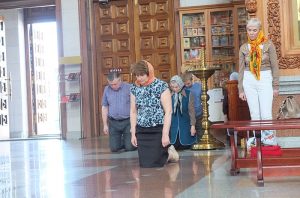Saturdays and Sundays of Great Lent are not considered fasting days. This is not because non-fasting foods are allowed on these days. (Non-fasting food is prohibited until Pascha for the physically healthy.) Rather, it is because on Saturdays and Sundays the full, real Liturgy is served. The Liturgy is the cornerstone of the Church, and whether or not it is celebrated determines whether it is a feast day or a day of mourning.
If during all of Great Lent you go to church only on Sundays you will not sense that it is Lent, regardless of abstention from food. One also needs to attend the special Lenten services to experience the contrast between these days and the other days of the year and to breathe in deeply the healthful spirit of the Forty Day Fast. The most important of these special services is the Liturgy of the Presanctified Gifts.
It differs from the traditional Liturgy in that the Bloodless Sacrifice is not offered to God in it. The Sacrifice is offered and the Gifts are consecrated in advance, and one can Commune of these. The entire service is a preparation for Communing of the Gifts prepared in advance.
The main idea that should arise from a consideration of the present topic is the yearning for Communion and the sorrow of separation. It is the reluctance to remain even for a single week without the Holy Gifts – even if one is not to feast, but rather to humble oneself and weep. Nonetheless, one cannot go without Communion, which means that one should at least Commune of the Gifts prepared in advance.
It is impossible to understand the Liturgy of the Presanctified Gifts – its ritual, origin, and necessity – without love for the Mysteries and for the practice of frequent Communion. Say what you will and think what you will, but if the tradition of the Early Church had been to Commune five or six times a year, then the Liturgy of the Presanctified Gifts would never have arisen. The very need for it would not have arisen. The need, however, is that one cannot be without Christ and without Communion. “For to me to live is Christ, and to die is gain.”
If one Communes rarely, then the Liturgy need only be served rarely, and the remaining days can be filled with the reading of the Typika, psalmody, akathists, teaching, and preaching. But this is an honest path to nowhere, which even a blind man should understand. The Liturgy cannot be abandoned. It is our only wealth. Rather, one should so love the Liturgy that one understands all of church life through it. Khomiakov was perfectly correct when he said: “Christianity is understood only by those who understand the Liturgy.”
Mary of Egypt did not go into the desert for many years without first Communing. Not yet cleansed of the passions, she received Communion and grace as a pledge for the future, so that she could receive Divine help in the desert.
We, too, in the words of Andrew of Crete, should settle “in the desert of repentance for the passions.”
During Lent the passions are awoken, tormenting and disturbing the soul. At times they do not simply trouble us, but burn and scorch us. The need for Divine help becomes more urgent and palpable. The Liturgy of the Presanctified Gifts was established for just the sort of people who labor in pious fasting, people who perceive their weakness with special keenness.
The service is united with Vespers and best served in the evening. (Do not rush to object – allow me to continue.)
Properly speaking, there is only one difficulty in serving it in the evening: the long Eucharistic fast. Everything else is a matter of technical details. The excuse that, well, it has not been done this way in ages does not work. There are many good things that we have not done, and many bad things that we have grown accustomed to. Are we really to hang a “do not disturb” sign in front of all errors, all the while dismissing our entire forgotten heritage?
The unusually long Eucharistic fast is the only serious concern in regards to serving the Liturgy of the Presanctified Gifts in the evening. But does not the fast exist precisely in order that we experience hunger and thirst, a subtle physical weakness, and a light dryness in the belly? Have we really entirely abandoned labor, effort, and abstinence, and become fit only for gratifying our weaknesses? One only needs to try, and there will turn out to be more people prepared to struggle and pray than we had thought. Children do not Commune at this service. They have Saturday and Sunday. One might say that older people cannot go long without medication and food. They, too, have Saturday and Sunday. As for those who can go without eating and drinking until evening, those who are strong and healthy, those who are disturbed by carnal passions due to their youth and excess of strength, let them endure and do battle with themselves. I will say more: in actual fact it turns out that older people are often more ready than young people to abstain from eating and to pray in preparation for Communion. And even young people yearn for ascetic struggle more often than we think.
There are no more difficulties. All that remains is delight.
It is worth celebrating this service in the evening at least once in life, if only for the sake of experience and for the sense of contrast. One should sing “having come to the setting of the sun, having beheld the evening light” not at 8:30 in the morning, but at 6:00 in the evening, when the sun is in fact in the west. It is worth experiencing how much better one can attune one’s mind to the words of the psalm “the lifting up of my hands as an evening sacrifice” in a darkened church, lit only by oil lamps, and not when the sun is shining brightly. “Let us complete our evening prayer unto the Lord” is incomparably better and more natural pronounced is the late evening, and not before noon. It is worthwhile for the body to understand how much better it is to pray on an entirely empty stomach, in order later to choose the more ancient and better path, even if it is a more difficult one.
All the singing, censing, and kneeling; all the processing with candles and incense around the Eucharistic Lamb; and all the prayers of St. Ephraim are intended for the evening. This service is mysterious and especially intimate. It eschews sunlight and electric light, inasmuch as the people Communing of Christ are those who have decided to take on a greater ascetic struggle, those who have restrained themselves for the sake of the broadness of the Heavenly Kingdom.
The Liturgy in general is not for the eyes of outsiders. It is a downright sickness and a true punishment that the doors to our services are always open to random people who buy candles and haggle at the table with the commemoration sheets at any moment of the service. The Gospel is being read or the Cherubic Hymn is being sung, and there will always be someone looking around at the candle-stands trying to find a place to put their candles. May God grant that we would grow up and become more serious, and one day at the exclamation “The doors! The doors!” actually shut the doors, so that there would be no coming and going until the end of the service!
This is what it is like at a regular Liturgy.
But at the Liturgy of the Presanctified Gifts it is even worse. Here there really is no place for random people wandering towards the flame, “not capable of praying with us.” They stand out immediately. They do not kneel with everyone else; they stare at the priest when he exclaims “The Light of Christ enlightens all!” and, what is even worse, during the entrance with the Gifts. By no means can they be given Communion.
The Liturgy of the Presanctified Gifts raises the bar of requirements for the clergy. One has to do a lot of explaining and teaching. One has to learn how to interpret the texts of Genesis and Proverbs read at these services. One needs to reassure those who see renovationism in everything to which they are unaccustomed.
Renovationism is the lowering of ecclesiastical discipline to conform to the spirit of the times. But a return to tradition is a movement in the opposite direction: from dispersion to self-possession and from indulgence to self-discipline. It is a move from proof-texting to an understanding of the spirit of the texts. So, for example, at the Liturgy of the Presanctified Gifts there are frequent prayers for catechumens and for “those preparing for holy illumination.” This is a remnant of ancient times, when people prepared for Baptism for a long time and went through the catechumenate. Today, in order neither to omit these prayers as unnecessary nor to read them just for the sake of reading them, we must find an application for them. After all, many people have relatives, friends, or acquaintances that have heard about Christ but have not accepted Baptism. Many are almost ready, but are still wavering. So could we perhaps accept commemoration lists with the names of those who are on the verge of Baptism but require a Divine push? Especially if these are the relatives of our regular parishioners. And even if there are no such people, one can still pray for the illumination with the light of Christian faith of the many peoples who still remain in the darkness of paganism.
This will not work everywhere. At the very least, this will not work everywhere immediately. This, too, is fine. Everyone is different and we do not need revolutions, radical reforms, or instantaneous uniformity. But we do need to have love for the Church and the fervent desire to do things correctly, and not simply to do “what we are used to.” If it is always “what we are used to,” then this is simply a matter of self-love and the fear of disturbing our familiar environment rather than advocating for the truth.
+++
Great Lent flies by quickly. And having flown by, it often leaves behind a residue of dissatisfaction. People say: the fast has gone by again, and I did not manage either to labor or to change myself. Pascha is drawing near, but I feel as if I have wasted the entire Forty Day Fast; I feel sorry for myself for only having half-fasted. I seem to know that “the kingdom of heaven sufferth violence” and that “strait is the gate, and narrow is the way,” but I keep repeating the same old habits, thinking that “it’s not the right time” and that I lack the strength. I relax, and I soothe the other people who are also relaxing.
Therefore even Pascha the Beautiful will not fill us to the brim with eternal life if we have not succeeded in using the fast to cleanse ourselves on the inside. The Lord will not pour “new wine into old wineskins” for us. It is we are to blame, not the Lord – for we have sat comfortably behind the fence for a variety of reasons.
This is not good. This is not pretty. This is not honest.
+++
The planets dance around the Sun.
Our Sun is Christ. But unto you that fear My name shall the Sun of righteousness arise with healing in His wings, says the Prophet Malachi (4:2).
Thus in the Liturgy of the Presanctified Gifts we touch the Lamb with fear and we ring the bell so that people would fall to their knees; we make prostrations; we sing many hymns of repentance and praise. And the heavenly powers serve the King of Glory with us invisibly. As a result this gives us such a prayerful feeling and disposition, such a thirst to appear before Christ, that it should be enough to last for a long time.
Lent will pass, but the reverential attitude will remain. After Pascha other feast days will follow, and the desire to pray with tears, to make prostrations, and to fast will not leave our souls. Therefore we need to breathe deeply of the sorrowful but healthful air of Great Lent, so that the chastity and austerity in this air will sink deeply into every cell of our spiritual organism.
Translated from Russian.




















